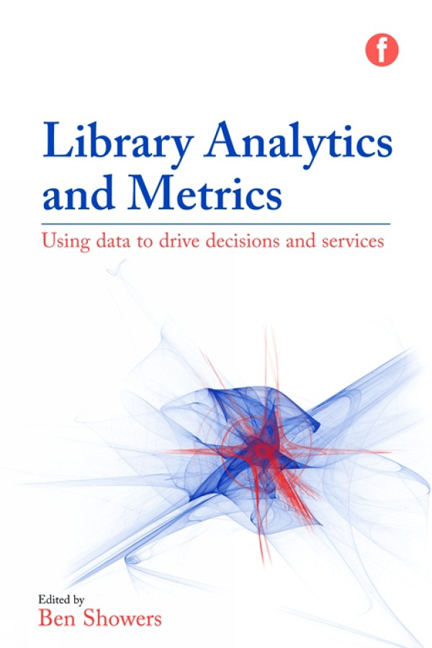Book contents
- Frontmatter
- Dedication
- Contents
- List of figures and tables
- Contributors
- Acknowledgements
- Introduction: getting the measure of analytics and metrics
- 1 Library data: big and small
- 2 Data-driven collections management
- 3 Using data to demonstrate library impact and value
- 4 Going beyond the numbers: using qualitative research to transform the library user's experience
- 5 Web and social media metrics for the cultural heritage sector
- 6 Understanding and managing the risks of analytics
- 7 Conclusion: towards a data-driven future?
- Index
1 - Library data: big and small
Published online by Cambridge University Press: 09 June 2018
- Frontmatter
- Dedication
- Contents
- List of figures and tables
- Contributors
- Acknowledgements
- Introduction: getting the measure of analytics and metrics
- 1 Library data: big and small
- 2 Data-driven collections management
- 3 Using data to demonstrate library impact and value
- 4 Going beyond the numbers: using qualitative research to transform the library user's experience
- 5 Web and social media metrics for the cultural heritage sector
- 6 Understanding and managing the risks of analytics
- 7 Conclusion: towards a data-driven future?
- Index
Summary
Chapter overview
As our cultural heritage institutions find themselves collecting and storing more and more of the usage data created by patrons’ and users’ interactions with the systems and services of the library, archive, museum or gallery, so there is an increase in the potential to extract value from this largely unstructured data.
This chapter will use the concepts of ‘big’ and ‘small’ data as a way to explore some of the analytics developments in academic and cultural heritage institutions. Rather than simply assuming the promises of big data and the desire to collect and analyse more and more data, small data provides us with a balance, a refocus on the localized, contextual and manageable data and can provide a fertile environment for the development of data analysis at ever greater scale; from individual institutions to groups or entire sectors and from individual data sets through to multiple and disparate datasets.
The chapter provides an overview of two early-stage analytics developments that promise to show how we can use both small and big data to shape our services and user interactions with them, both at an organizational level and at a sector level (although the case studies do not use the concepts of big and small data in articulating the work they do). The two case studies featured are:
• CASE STUDY 1.1 Nurse, R., The potential of data to inform personalized recommendations at the Open University Library (The Open University), p. 5
• CASE STUDY 1.2 Showers, B., Library ‘big’ data: developing a shared analytics service for academic libraries (Jisc), p. 14
But before we explore the potential of big and small data for libraries and cultural heritage organizations it is worth briefly unpacking these terms and attempting to arrive at a definition for each.
Defining big and small data
Big data is commonly thought of as a collection of datasets that are so large and complex that they are difficult to process using standard database management and processing tools. Typically, the term is applied in areas such as physics or astronomy, where the data collected from experiments and observations is enormous and the burden of storage, analysis and visualization is tremendous.
- Type
- Chapter
- Information
- Library Analytics and MetricsUsing Data to Drive Decisions and Services, pp. 1 - 22Publisher: FacetPrint publication year: 2015



